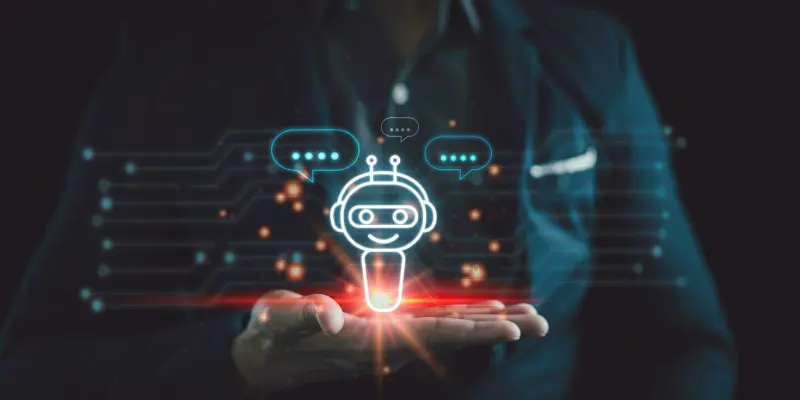The evolution of artificial intelligence (AI) chatbots has revolutionized human-AI interactions, making them more intuitive, seamless, and impactful across various industries. Today, these advanced systems replicate human-like conversations with remarkable accuracy, thanks to sophisticated architectures and tokenization methods. By breaking text into smaller, semantically precise units, chatbots can process up to 128,000 tokens in a single context, offering capabilities that enhance decision-making and collaboration. The implications of this technology are profound, especially in sectors like healthcare, education, finance, and engineering. For instance, precise language processing in chatbots aids healthcare professionals in patient diagnostics and treatment plans while enabling educators to provide personalized learning experiences. Finance professionals benefit from chatbots that can analyze vast amounts of data to make informed investment decisions. The engineering field, meanwhile, sees improved interdisciplinary collaborations through enhanced communication and project management. Central to this transformation is the ability of chatbots to retain and recall context throughout interactions, ensuring continuity and coherence. This is particularly vital in education, where the flow of information impacts learning outcomes, and in healthcare, where tracking patient history is crucial. These systems exhibit an impressive 93.2% accuracy in preserving crucial information across multi-topic conversations, demonstrating their effectiveness in handling complex dialogues.
Advanced Capabilities
The predictive prowess of AI chatbots sets them apart, boasting an 87% accuracy in reasoning tasks. This makes them adept at generating contextually accurate responses, which is invaluable in fields such as software code generation. Maintaining logical coherence in responses is essential to avoid errors and inefficiencies. Reinforcement Learning from Human Feedback (RLHF) further refines chatbot performance, aligning them closely with human expectations. This technique has proven to reduce harmful outputs by 76%, balancing safety with high-performance standards. RLHF-enhanced models have demonstrated improved task-specific accuracy by 68%, showcasing their growing importance in regulated industries such as healthcare and finance. In these sectors, the need for reliable and safe AI tools is paramount, given the potential consequences of erroneous outputs. AI chatbots’ ability to manage complex medical terminologies accurately not only enhances patient care but also streamlines administrative processes. In education, chatbots support personalized learning by adapting to individual student needs, ultimately improving educational outcomes. Their proficiency in over 147 languages facilitates global communication, breaking down barriers and promoting inclusivity and accessibility. Despite these advancements, AI chatbots still face challenges in creativity and genuine understanding. While they excel in structured reasoning and domain-specific tasks, their performance declines in situations requiring innovative thinking. Ongoing research focuses on enhancing their adaptability and creativity to bridge this gap.
Real-World Applications
In the healthcare industry, AI chatbots are making notable strides by accurately handling complex medical terminologies, thus improving patient care and support. These systems are adept at processing intricate information, enabling healthcare providers to streamline operations and focus more on patient-oriented tasks. Chatbots can also facilitate mental health support by providing immediate, accessible counseling services, thereby alleviating the burden on human professionals. In the realm of education, AI chatbots are transforming the learning experience by offering personalized educational content that caters to individual needs. They adapt to each student’s learning pace, providing customized resources and feedback, which can significantly enhance learning outcomes. Teachers and instructors can leverage these tools to manage administrative tasks, freeing up time for more interactive and engaging teaching methodologies. Financial services also benefit from the integration of AI chatbots, which assist in the analysis of complex financial data and provide insights for decision-making. They enable more efficient customer service, swiftly addressing queries and concerns while ensuring accuracy and compliance. These systems assist in fraud detection and risk management, offering timely and informed interventions to protect both institutions and consumers.
Future Prospects
The advancement of artificial intelligence (AI) chatbots has dramatically transformed how humans interact with AI, making these engagements more natural and efficient across numerous industries. Modern chatbots can mimic human conversations with notable precision due to advanced architectures and tokenization techniques. By dividing text into smaller, semantically relevant units, these bots can handle up to 128,000 tokens in one context, enhancing decision-making and collaborative efforts. This technology has significant repercussions in fields such as healthcare, education, finance, and engineering. In healthcare, for example, chatbots’ accurate language processing aids doctors in diagnosing and creating treatment plans, while in education, they enable tailored learning experiences. Financial experts benefit from chatbots’ ability to process extensive data to inform investment choices, and engineers see improved collaboration and communication on projects. A key feature of these chatbots is their capacity to maintain and recall context throughout interactions, which is critical for effective communication in education and essential for tracking patient history in healthcare. Impressively, these systems achieve a 93.2% accuracy rate in retaining vital information during multi-topic conversations, proving their capability in managing intricate dialogues.

